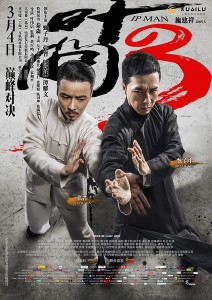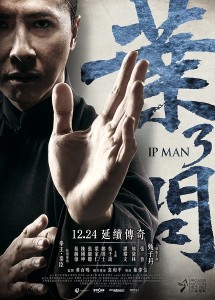Ip Man 3
叶问3
Hong Kong/China, 2015, colour, 2.35:1, 3-D (China only), 104 mins.
Director: Ye Weixin 叶伟信 [Wilson Yip].
Rating: 6/10.
A mellow but dramatically disappointing end to the Ip Man trilogy, with so-so action and a choppy script.
Hong Kong, 1959. Ye Wen (Zhen Zidan) – popularly known by his Cantonese name Ip Man – has sent his elder son Ye Zhun to Foshan, Guangdong province, China, to further his studies and now lives with just his wife Zhang Yongcheng (Xiong Dailin) and younger son Ye Zheng (Wang Shi). One day Ye Wen is visited by a cocky young man, Li Xiaolong (Chen Guokun), who auditions to be a pupil but is rejected. When Ye Zheng is involved in a fight with another pupil, Zhang Feng (Cui Can), at Zhiren Primary School, Ye Wen meets the boy’s father, rickshaw man Zhang Tianzhi (Zhang Jin), who like Ye Wen is a martial artist of the Yong Chun [Wing Chun] school. Zhang Tianzhi later tells Ye Wen that he would like to test his version of Yong Chun against him one day. Zhang Tianzhi makes extra money in underground fights organised by an American, Frank (Mike Tyson), who wants to acquire the land the primary school is built on. Frank’s chief fixer, Ma Jingsheng (Tan Yaowen) tries to bully the  school head (Liu Yida) into signing over the land but is stopped by Ye Wen. That night Ma Jingsheng returns with a large gang but is again fought off by Ye Wen, with the help of Zhang Tianzhi who is passing by. Tian Aoshan (Liang Jiaren), the former martial arts master of Ma Jingsheng, confronts him over his behaviour and only the arrival of local policeman Fei Bo (Zheng Zeshi) prevents a fight. Furious, Ma Jingsheng pays Zhang Tianzhi to beat up Tian Aoshan, who ends up in hospital. He then kidnaps Ye Zheng and tries to humiliate Ye Wen into forcing the school to sell its land; but Ye Wen, helped by Zhang Tianzhi, fights his way out and the gang is rounded up by police. Frank delegates a muay thai fighter (Sarut Khanwilai) to take care of Ye Wen, but Ye Wen sends him packing. Ye Wen finally visits Frank and the two fight, though inconclusively. Meanwhile, Zhang Tianzhi finally achieves his dream of opening his own martial arts school and, amid much publicity, proclaims his version of Yong Chun to be the true one. Ye Wen, however, has other things on his mind, following some shocking news about his wife.
school head (Liu Yida) into signing over the land but is stopped by Ye Wen. That night Ma Jingsheng returns with a large gang but is again fought off by Ye Wen, with the help of Zhang Tianzhi who is passing by. Tian Aoshan (Liang Jiaren), the former martial arts master of Ma Jingsheng, confronts him over his behaviour and only the arrival of local policeman Fei Bo (Zheng Zeshi) prevents a fight. Furious, Ma Jingsheng pays Zhang Tianzhi to beat up Tian Aoshan, who ends up in hospital. He then kidnaps Ye Zheng and tries to humiliate Ye Wen into forcing the school to sell its land; but Ye Wen, helped by Zhang Tianzhi, fights his way out and the gang is rounded up by police. Frank delegates a muay thai fighter (Sarut Khanwilai) to take care of Ye Wen, but Ye Wen sends him packing. Ye Wen finally visits Frank and the two fight, though inconclusively. Meanwhile, Zhang Tianzhi finally achieves his dream of opening his own martial arts school and, amid much publicity, proclaims his version of Yong Chun to be the true one. Ye Wen, however, has other things on his mind, following some shocking news about his wife.
REVIEW
Five years after its masterly second instalment, the Ye Wen [Ip Man] trilogy comes to a surprisingly mellow and dramatically disappointing close with Ip Man 3 叶问3. In light of the second film’s success, and the Ip Man-ia of the time, star Zhen Zidan 甄子丹 [Donnie Yen] had been loath to make another in the series, unsure whether the team, led by Hong Kong director Ye Weixin 叶伟信 [Wilson Yip], could top Ip Man 2 叶问2 (2010). In the event, his instinct proved correct: Ip Man 3 looks a treat and is respectably acted, but none of the action is memorable and the screenplay is flawed on several levels. In many respects, Ip Man: The Final Fight 叶问 终极一战 (2013), from the “rival” series directed by Hong Kong’s Qiu Litao 邱礼涛 [Herman Yau], traverses some of the same ground more entertainingly – and certainly more vigorously.
The original plan was to focus on the relationship between Ye Wen and his most famous pupil, Li Xiaolong 李小龙 [Bruce Lee], during the autumn of Ye Wen’s life. Reportedly, that idea was ditched when no actor could be found to convincingly portray Li in such depth, and all that’s left of it are two scenes with Li played by Hong Kong actor/lookalike Chen Guokun 陈国坤 (the goalkeeper in Shaolin Soccer 少林足球, 2001) with cocky, nose-flicking attitude. Instead, Ip Man 3 has several competing plotlines, with the now famous master taking on (a) an American gangster (Mike Tyson) who wants to demolish his son’s primary school, (b) the aforesaid foreigner’s hordes of thugs, (c) a rival practitioner of the Yong Chun [Wing Chun] school who gets too big for his boots, and (d) the growing problem of his sickly wife.
The nationalism and xenophobia of the first two films are almost completely absent, with just a couple of token foreign nasties acted in equally over-cooked style by US boxer Mike Tyson and by US-born Jonathan Kos-Read (aka China’s resident foreigner Cao Cao 曹操) with a ridiculous British accent. But like the two previous movies, Ip Man 3 has the same nostalgia for a bygone Hong Kong of the imagination, as well as a cleverly concocted retro feel that combines kind-of 1950s/1960s set dressing with a kind-of 1970s pulp martial-arts plot. But it’s also infused with “modern” elements like the burnished interiors of d.p. Xie Zhongdao 谢忠道 [Kenny Tse] – the third d.p. in the series – and a typical wall-of-heroic-noise by returning Japanese composer Kawai Kenji 川井憲次. Apart from the typical 1970s thug of Tan Yaowen 谭耀文, performances are also more modern than of the era in which the film is set. Despite all that, Ip Man 3 is still a visual treat, and conjures up a vague past era with a comfy nostalgia.
The more serious problem is the structure of the script – once again by the very variable Huang Zihuan 黄子桓 [Edmond Wong] – which starts out by evoking old-style martial arts dramas (warehouse settings, rival fight schools, a pyramid structure) but ends up breaking the basic rules by veering away from the obvious finale and becoming bogged down in Ye Wen’s family problems. The expected confrontation with Tyson’s foreign villain doesn’t form the film’s climax and is also left unresolved. Instead, the final fight is between Ye Wen and a pretender to his Yong Chun throne who’s spent most of the film being a kind of pal. (Genre rules would normally have the two of them teaming up against the foreign villain.)
Their six-minute set-to, with weapons as well as fists, is good but by no means classic – which could be said for all the action scenes. The absence of Hong Jinbao 洪金宝 [Sammo Hung] – who choreographed the first two films and also acted in the second – is badly felt, and veteran Yuan Heping 袁和平, now well past his sell-by date when it comes to staging action, comes up with nothing to match Hong’s inventive setpieces. Time and again, Yuan’s staging simply recalls better versions of similar fights in other films: a set-to in an enclosed lift, Chinese martial arts vs western boxing, and so on.
Zhen shows the same dignity and composure he brought to the lead role in the other two films and acquits himself well enough in the action; but he looks like he’s just clocking in this time round rather than fully investing himself in the character. (Now 52, Zhen has said this may be his last big action role.) Purely on an acting level, Huang Qiusheng 黄秋生 [Anthony Wong] was far more involving as the ageing master in Ip Man: The Final Fight. Once again, Mainland martial artist Zhang Jin 张晋 – the best thing about SPL2: A Time for Consequences 杀破狼II (2015), as the snazzy prison warden – cuts a physically impressive figure, here as the Yong Chun wannabe; but his character is shortchanged by the choppy script, with no real depth or motivation.
Ip Man 3 ends up being watchable rather than dramatically involving, and mellow rather than truly elegaic. Despite his hamming, Tan has a much more complete role as the villain’s chief fixer, but is elbowed out of the film midway. Aside from Mainland actress Xiong Dailin 熊黛林, who is less window dressing this time round as Ye Wen’s wife, other roles are bits. The least said about Tyson’s acting (in both English and Cantonese) the better; his action face-off with Zhen is OK but nothing compared with Zhen’s vs another western nastie, played by late British martial artist Darren Shahlavi, in Ip Man 2.
For all its detailed production design, the film is strangely loose with the facts. In 1959 Ye Wen’s younger son Ye Zheng was actually in his early 20s rather than at primary school, and Ye Wen himself was in his mid-60s rather than (Donnie Yen’s) early 50s. For the record, the film was shot on the extensive set built for Bodyguards and Assassins 十月围城 (2009) outside Shanghai.
CREDITS
Presented by Pegasus Motion Pictures (Hong Kong) (HK), My Pictures Studio (CN), Dreams Salon Entertainment Culture (HK), Starbright Communications (HK). Produced by Pegasus Motion Pictures Production (HK).
Script: Huang Zihuan [Edmond Wong], Chen Dali, Liang Liyan [Jill Leung]. Photography: Xie Zhongdao [Kenny Tse]. Editing: Zhang Jiahui [Cheung Ka-fai]. Music: Kawai Kenji. Production design: Mai Guoqiang [Kenneth Mak]. Costume design: Li Bijun [Lee Pik-kwan]. Sound: Wang Jie, Zeng Jingxiang [Kinson Tsang], Yao Junxuan. Action: Yuan Heping. Yong Chun advice: Ye Zheng [Ip Ching], Ye Zhun [Ip Chun]. Visual effects: Liang Weimin, Yu Guoliang, Lin Jiale (Free-D Workshop).
Cast: Zhen Zidan [Donnie Yen] (Ye Wen), Zhang Jin (Zhang Tianzhi), Xiong Dailin (Zhang Yongcheng, Ye Wen’s wife), Tan Yaowen (Ma Jingsheng), Mike Tyson (Frank), Wu Qianyu (Huang, schoolteacher), Zheng Zeshi [Kent Cheng] (Fei Bo/Fat Ball, policeman), Liang Jiaren (Tian Aoshan), Zhang Jicong (Xu Li, pupil of Ye Wen), Chen Guokun (Li Xiaolong/Bruce Lee), Cai Hanyi (Li Sheng, journalist), Liu Yida (school head), Kang Yu (Tan, master), Luo Mang (Luo, master), Liang Xiaoxiong (Lee, master), Chen Chao (Chen, master), Wang Shi (Ye Zheng, Ye Wen’s younger son), Cui Can (Zhang Feng, Zhang Tianzhi’s son), Sarut Khanwilai (Thai boxer), Jonathan Kos-Read (Edward), Zong Fei (Frank’s wife), Liu Yifei (Frank’s daughter).
Release: Hong Kong, 24 Dec 2015; China, 4 Mar 2016.
